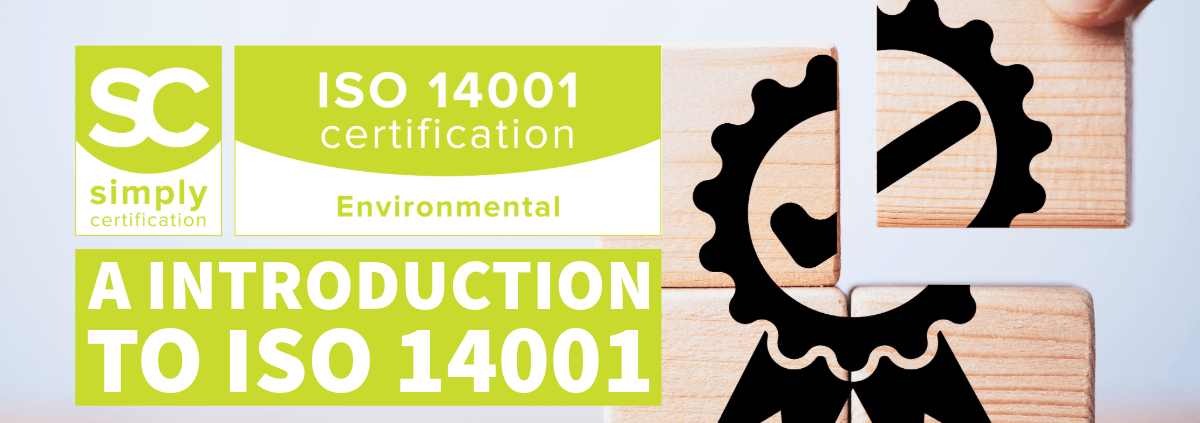An Introduction to ISO 14001: Environmental Management Standard
Why do we need ISO standards- and what are they for?
Environmental awareness is at an all time high. In an era marked by growing environmental concerns and heightened awareness of sustainability, businesses worldwide are increasingly turning to standards like ISO 14001 to address their environmental impact.
ISO 14001 provides a framework for organisations to establish and maintain an effective Environmental Management System (EMS).
The 3 main ISO standards/ the 3 ISO standards that Simply Certification certify against are ISO 14001 (Environmental Management), ISO9001 (Quality Management Systems) and ISO 45001 (Health and Safety Management).
In this blog, we’ll provide an introduction to ISO 14001, its significance, key principles, implementation process, and the benefits it brings to businesses.
The basics – understanding ISO 14001
ISO 14001 is an internationally recognised standard for Environmental Management Systems developed by the International Organisation for Standardisation (ISO).
It outlines the requirements for organisations to identify, manage, monitor, and improve their environmental performance. ISO 14001 is based on the Plan-Do-Check-Act (PDCA) cycle, providing a systematic approach to environmental management.
Businesses, particularly in the built environment recognise the importance of minimising their environmental footprint and complying with environmental regulations. ISO 14001 provides a framework for companies to address environmental challenges, enhance sustainability practices, and demonstrate their commitment to responsible business operations.
What are the key principles of ISO 14001?
These core principles help businesses to maximise environmental performance and meet compliance standards. The six principles are:
- Environmental Policy
- Planning
- Implementation and Operation
- Monitoring and Measurement
- Evaluation of Compliance
- Continuous Improvement
What do these principles mean for my business?
ISO14001 is centred around 6 key principles:
Environmental Policy
Businesses are required to establish a clear environmental policy that reflects their commitment to compliance, pollution prevention, and continual improvement.
Planning
Identifying environmental aspects and impacts, setting objectives and targets, and developing plans to achieve them.
Implementation and Operation
Implementing the EMS, ensuring the availability of resources, competence, and communication processes to achieve environmental objectives.
Monitoring and Measurement
Monitoring environmental performance, conducting regular evaluations, and measuring progress against objectives.
Evaluation of Compliance
Ensuring compliance with applicable legal and other requirements related to environmental aspects.
Continuous Improvement
Continuously improving the EMS through corrective actions, preventive actions, and management reviews.
What is the Implementation Process of ISO 45001?
Implementing ISO 14001 involves several key steps:
#1 Initial Assessment
A business should assess its current environmental performance, identify environmental aspects, and determine legal and regulatory requirements.
#2 Gap Analysis
A gap analysis is a great way to assess your current processes against ISO 14001 requirements to identify areas for improvement. We can help you with this if you need it.
#3 Documentation
Develop documentation including an environmental policy, objectives, procedures, and records required by ISO 14001.
#4 Training and Awareness
Provide training to employees to raise awareness of environmental issues and their roles in achieving environmental objectives.
#5 Implementation
Roll out the EMS across the organisation, ensuring integration with existing processes and systems.
#6 Internal Audit
Conduct internal audits to evaluate the effectiveness of the EMS and identify areas for improvement.
#7 Management Review
Review the EMS regularly with top management to ensure its suitability, adequacy, and effectiveness.
Finally- #8 Certification
Engage a third-party certification body like us to audit the EMS and grant ISO 14001 certification upon successful compliance.
Top Tips for Certification
Many companies fail to get the basics right before they come to us for certification. As a certification body we must remain impartial when assessing the suitability for ISO and that means that we cannot help you with readying for certification.
However, there are several compliance consultancies that can help you do this. A good management system will also help you to carry out the correct procedures and create the right paperwork in readiness for certification.
If you are serious about certification, then get your business ready before you submit for certification. This will save you time and money dealing with any delays due to non-conformances.
Benefits of ISO 14001
This may all sound complicated but a dedication to environmental procedures means that certification is just the icing on the cake of safe, effective and risk-reducing business activities. A business that shows dedication to environmental processes not only protects its people, products and profitability but reduces any environmental risks from business operations, mitigating reputational damage and increasing positive brand associations by customers and its supply chain.
Maintaining certification is the hallmark of quality that your business is continually improving. By gaining and maintaining ISO 14001, your business, your people and your customers will benefit from:
Environmental Compliance
ISO 14001 helps organisations comply with environmental regulations and legal requirements, reducing the risk of fines and penalties.
Reduced Environmental Impact
By identifying and managing environmental aspects and impacts, organisations minimise their environmental footprint and resource consumption.
Cost Savings
Implementing ISO 14001 often leads to improved resource efficiency, reduced waste generation, and lower operating costs.
Access to Markets and Opportunities
ISO 14001 certification may be a prerequisite for doing business with certain customers, suppliers, or government agencies.
Improved Stakeholder Relations
Demonstrating environmental commitment fosters trust and credibility with stakeholders, including employees, investors, and communities.
Better Brand Value
Although brand value is an ‘intangible’ in many ways, the positive associations that a business can foster through good environmental practices is only set to become more important in tomorrow’s world. A business with ISO 14001 certification signals to the world that they value the world in which they operate just as highly as the market in which they make money.
By embracing ISO 14001 principles and practices, you can enhance your reputation as an environmentally responsible entity. ISO 14001 certification not only benefits your business and your people, but also contributes to the overall well-being of the planet, ensuring a more sustainable future for generations to come.
If you are ready for certification you can speak to our friendly team. Or, if you’re not sure where you are currently, contact us today to book a Gap Analysis.






